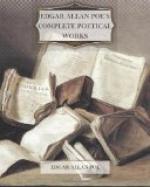Between the lines may be read the history of his own love. “The Egeria of his dreams—the Venus Aphrodite that sprang in full and supernal loveliness from the bright foam upon the storm-tormented ocean of his thoughts,” was a little girl, Elmira Royster, who lived with her father in a house opposite to the Allans in Richmond. The young people met again and again, and the lady, who has only recently passed away, recalled Edgar as “a beautiful boy,” passionately fond of music, enthusiastic and impulsive, but with prejudices already strongly developed. A certain amount of love-making took place between the young people, and Poe, with his usual passionate energy, ere he left home for the University had persuaded his fair inamorata to engage herself to him. Poe left home for the University of Virginia, Charlottesville, in the beginning of 1825. lie wrote frequently to Miss Royster, but her father did not approve of the affair, and, so the story runs, intercepted the correspondence, until it ceased. At seventeen, Elmira became the bride of a Mr. Shelton, and it was not until some time afterwards that Poe discovered how it was his passionate appeals had failed to elicit any response from the object of his youthful affection.
Poe’s short university career was in many respects a repetition of his course at the Richmond Academy. He became noted at Charlottesville both for his athletic feats and his scholastic successes. He entered as a student on February 1,1826, and remained till the close of the second session in December of that year.
“He entered the schools of ancient and modern languages, attending the lectures on Latin, Greek, French, Spanish, and Italian. I was a member of the last three classes,” says Mr. William Wertenbaker, the recently deceased librarian, “and can testify that he was tolerably regular in his attendance, and a successful student, having obtained distinction at the final examination in Latin and French, and this was at that time the highest honor a student could obtain. The present regulations in regard to degrees had not then been adopted. Under existing regulations, he would have graduated in the two languages above-named, and have been entitled to diplomas.”
These statements of Poe’s classmate are confirmed by Dr. Harrison, chairman of the Faculty, who remarks that the poet was a great favorite with his fellow-students, and was noted for the remarkable rapidity with which he prepared his recitations and for their accuracy, his translations from the modern languages being especially noteworthy.




